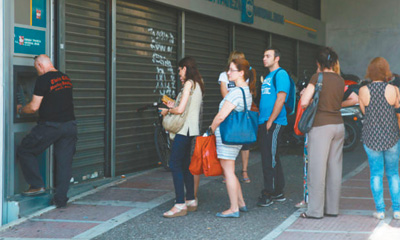Pay attention to the four chaotic phenomena of western party politics: system decline and separation from the masses

Interest groups that advocate gun freedom play an important role in American election politics, and the Trump administration is still dissatisfied with the interests of gun control. The picture shows that on March 14, 2018, American students marched in Washington and called for strengthening the control of guns.
People’s vision

Due to the long-term low administrative efficiency of the local government, the Italian capital Rome and other places are often "paralyzed" due to unexpected situations such as heavy snow. The picture shows that on February 26, 2018, a cleaner cleared the snow outside the Roman government.
Xinhua news agency

The Greek debt crisis deteriorated sharply after the 2015 general election, which triggered a "frenzy" of domestic runs. The picture shows that on July 2, 2015, the people of Athens lined up in front of the cash machine to withdraw money.
Our reporter Han Bingzhen photo
Brexit, Trump’s victory, Italy’s failed constitutional referendum, and the rise of populism and protectionism in Europe and America … … A series of dazzling events have exposed various drawbacks of the democratic model advertised by the west, such as partisan disputes, civil strife, mutual strife, social tears and so on. Western-style democracy, with election politics and multi-party competition politics as its core, has been unable to coordinate various social forces and has increasingly lost its function of providing protection for the future development of the country. As william jones, president of the Washington branch of Global Strategic Information magazine, said, "Western democracy is not shrinking, but collapsing, and it has been going on for quite a long time."
Party struggles continue.
Struggle for power and gain and get rid of the masses.
Become a tool of interest groups
Western party politics is characterized by multi-party competition. In western party politics, political parties are political organizations that carry out activities around seizing, maintaining and participating in political power. The game between political parties around power is the normal state of western party politics. As western political parties are increasingly divorced from the masses and become political tools of a few vested interests, this game is often at the expense of national interests.
In the 2016 US presidential election, Democratic candidate Hillary Clinton and Republican candidate Trump attacked each other without scruple in order to win the election, and the issues that the people really care about became a foil. Hillary called Trump a "madman" and Trump threatened: "If I am elected, I will order the Attorney General to appoint a special prosecutor to investigate you and send you to prison!"
Wit Ayers, chairman of the North Star Poll Research Institute in the United States, told this reporter that Hillary and Trump attacked each other "mainly in personality, scandals, etc., but lacked depth in policy." This tit-for-tat between the two men is not from justice, nor from mutual hatred, but only to serve the election on behalf of their respective parties. Analysts believe that the American people have long lost trust in the two parties taking turns to sit in the village, and the "election show" aims to attract more people’s attention. Sure enough, Trump immediately denied that he would sue Hillary after winning the election.
On the evening of January 19, 2018, the US Senate failed to pass the provisional appropriation bill of the federal government, and the non-core departments of the federal government were forced to close from 0: 00 on January 20. In less than a month, the government closed the door twice, which became another farce caused by the "donkey-elephant dispute". According to American media analysis, the closure of federal government agencies will have a wide impact on society and economy, with a daily loss of about 6.5 billion US dollars.
The reason why the Democratic Party and the Republican Party refuse to compromise is not the appropriation itself, but the private goods entrained in the appropriation bill — — "Deferred repatriation of children who arrived in the United States" bill and other issues. The "Deferred Repatriation of Children Arriving in the United States" bill was signed and implemented by former President Barack Obama in 2012, but was abolished by Trump in September 2017.
According to statistics, since 1977, the United States federal government departments have been partially closed for more than 10 times, as short as one day and as long as several weeks, with an average of once in each presidential term.
It took more than five months after the German election to form a successful cabinet, which was also caused by party interests. In September 2017, the Coalition Party and the Social Democratic Party, which were jointly in power, ranked first and second in the German general election, but their votes dropped sharply from the previous general election. The Social Democratic Party believes that being in power together with the Coalition Party is the main reason for the decline in its vote rate, so it resolutely refuses to form a joint cabinet again. The Coalition party tried to form a cabinet with the Liberal Democratic Party and the Green Party, but it ended up with an uneven distribution of interests.
Finally, German President Steinmeier came forward to mediate and let the Coalition party and the Social Democratic Party resume negotiations. After new bargaining, the two sides finally reached an agreement to form a joint cabinet, but the credibility of both parties was hit hard. Borotman, chairman of the German Machinery and Equipment Manufacturing Federation, publicly stated that the formation of the German cabinet was "each with his own thoughts, listless and uninspired". Eugen Unz, editor-in-chief of Berlin Daily, pointed out that the deadlock in the formation of the cabinet shows the extremely narrow consensus space between the parties. For Germany, an industrial power and a European power, "this formation process is really a long joke."
Fighting among themselves.
There is intrigue among politicians.
Put the interests of the people behind you.
The phenomenon of "abandoning politics for business and entering politics from business" often appears in western political circles, which gives people the impression that politics has become more civilian. In fact, the former is often a political reward given to businessmen under the transaction of power and money, and the core is their own interests. Once the interests are damaged, politicians will not hesitate to tear their faces. If there is still a little ideological struggle in the party struggle, there are only naked interests behind the intra-party struggle.
In September 2014, although the then British Prime Minister David Cameron did not support Brexit, he launched the "Brexit referendum" to fulfill his campaign promise. However, his old colleague, former mayor of London, chose to "rebel" and joined forces with iain duncan smith, the minister for the aged, to form the Conservative Party "Brexit", which caused a split within the ruling party.
In an interview with The Sunday Times, a British Conservative MP who supported Brexit even made an explicit statement: "I don’t want to stab Cameron from behind, because I want to stab him from the front, so I can see the expression on his face when he is stabbed … …” A referendum on the future fate of the country turned out to be a tool for venting personal grievances.
It is widely speculated in British public opinion that Johnson set off an infighting "the meaning of drunkenness is not wine" in order to seize the throne of the Prime Minister. After the referendum, Johnson took the post of Foreign Minister, but on the issue of how to leave the European Union, he still strongly disagreed with Prime Minister Theresa May, and it is likely to continue to force the palace.
Coincidentally, in December 2016, Renzi, then Italian Prime Minister and General Secretary of the Democratic Party, announced his resignation after his failed constitutional referendum. Not only did the opposition party sing a triumphant song, but the "minority" in the party led by former Prime Minister D ‘Alema and former General Secretary Belsani also sang and danced. According to statistics, the "minority" of the Democratic Party "contributed" at least 10% of the votes to the opposition party in the referendum, otherwise the result of the constitutional referendum may be completely different.
The "minority" did this mainly because of their personal dissatisfaction with Renzi and their fear of losing their vested interests. After Renzi became the general secretary of the Democratic Party in December 2013, he vigorously promoted the young people in the Party, and the right to speak of Belsani and other party elders was weakened. After he became prime minister, he made drastic reforms, which also touched the "cheese" of many party elders. The revision of the Labor Law made the two sides "meet each other at war" in the parliament, which led to a de facto division within the Democratic Party.
According to media reports, during the re-election of the European Commission in 2014, Italy took the rotating presidency of the Council of the European Union. D ‘Alema was active at that time and hoped to become the EU’s High Representative for Foreign Affairs and Security Policy. However, Renzi insisted on nominating Mogherini, then Italian Foreign Minister, which led to D ‘Alema’s "killing" back to politics as an enemy.
The Italian "Evening Post" mercilessly criticized the split of the Democratic Party, bluntly saying that "this split is irresponsible!" Both parties are evading their responsibilities in the process of infighting, and even Renzi had the opportunity to avoid division. The uncertainty brought by the split of the ruling party to Italian politics "will undoubtedly make the supporters of the Democratic Party feel painful and confused".
Political polarization
The decline of western governance system
Leading to the rise of extremist forces
The real democratic model should allow all social forces to negotiate in order to reach compromise and balance, instead of playing a zero-sum game with the goal of overwhelming and defeating each other. The constant polarization of western party politics makes the possibility of compromise smaller and smaller, so that the negotiation of different forces has become an either-or struggle. The traditional political parties are deeply mired in this vicious struggle, and have no time to take care of the future development of the country, which makes the people hate it, but also provides favorable conditions for the development of extremism and populism.
On March 5, 2018, the results of the Italian general election were announced, and the populist party "Five-Star Movement" became the biggest winner, becoming the largest party in parliament with nearly 33% of the votes. The far-right party Alliance Party defeated the Italian Kadima Party of Silvio Berlusconi, the leader of the center-right alliance, with more than 17% of the votes. At that time, "‘ Five-star sports ’ The fear that the Coalition with the Coalition party will completely split the EU has spread to the whole of Europe.
Why can the "five-star movement" win the election? Analysts pointed out that Italy’s current economic growth is weak, the gap between the rich and the poor is wide, and the unemployment of young people is serious. The existing political parties have no effective countermeasures for developing the economy and improving people’s livelihood except fighting. The "Five-Star Movement" aimed at traditional political forces and stormed with full firepower, winning the favor of a large number of voters, especially young voters. The Coalition party is anti-European and anti-immigrant. In the general election, it followed the example of US President Trump and put forward the slogan of "Italy first", which also successfully took away the right to speak of the center-right alliance.
Earlier, the French far-right party "National Front" won eight seats in the French parliamentary elections, and its leader Le Pen was elected as a member for the first time. In the German general election, both the traditional big-party Coalition Party and the Social Democratic Party hit record lows, while the right-wing party, the German Choice Party, with slogans of anti-EU and anti-refugees, jumped to become the third largest party in the Federal Parliament with 13% of the votes. In Austria, the far-right party Liberal Party and the center-right People’s Party formed an alliance to form a cabinet, which was regarded by the French newspaper Liberation as "the latest harvest of the expansion of right-wing forces in Europe". Belgium’s "Standard" also bluntly said that more than a quarter of voters were attracted by the political platform of the Liberal Party, which proved that right-wing populism had returned to Austria’s "mainstream society".
At present, the biggest threat to western democracy is that the democratic system fails to meet the basic needs of the people, thus giving birth to the political trend of "de-moralization". William jones, president of the Washington branch of Global Strategic Information magazine in the United States, told this reporter: "Most voters think that no one in the government is fighting for them, which makes the willingness to vote declining. Even if they vote, they are more inclined to make choices with anti-establishment protest thinking."
Election alienation
Everything is for the election.
Loose promises and willful decisions
Western democratic theory claims that only by implementing a competitive political party system, through the choice of public opinion and the game of political parties, can an ideal ruling party and leader be produced. However, today’s western political parties have been kidnapped by votes. In order to win more votes, candidates try their best to please voters. Once elected, their promises will become a dead letter. Ruling leaders often "bet" on their power games through early elections or referendums.
Cameron’s wishful thinking when he decided to hold a referendum on Brexit was that the referendum could not pass anyway. He could use the referendum to attack the opposition party, consolidate his power, and take the opportunity to blackmail the EU. However, it is undoubtedly a reckless political gamble to hand over a major political issue involving the future and destiny of the country to ordinary voters who have insufficient and unbalanced access to information and are easily confused by immediate interests. With the unexpected victory of "Brexit", Cameron, a politician who lacks responsibility and responsibility, has to bid farewell to politics.
In order to win the referendum on Brexit, Conservative politicians, represented by Smith, concocted false statements such as "Britain pays 350 million pounds to the EU every week, and the money can be used for the national medical system after leaving the EU". After Brexit was a foregone conclusion, people discovered that the cost of Brexit was far higher than expected. Polls show that most people regret Brexit and hope to reverse the Brexit process. Politicians’ disregard for national interests has brought Britain into a period of confusion.
Renzi initiated Italy’s constitutional referendum, which also wanted to expand government power and clear the way for the next political and economic reform. Italy’s provincial administrative divisions and the Italian Economic and Work Committee, which are planned to be abolished, have long been criticized by the public. The opposition party, however, was wily and successfully diverted the attention of voters with the phrase "Renzi’s constitutional amendment is to want dictatorship".
In his resignation speech, Renzi said that Italian politics was originally a stage where feng shui turns, and it doesn’t matter whether you win or lose. "Everything will be the same after every election." But he still wants to speak out, because he wanted to do something for the future of Italy. Because there were too many chairs to be removed in the reform, "only my chair was removed".
The opposition parties in western countries take advantage of people’s dissatisfaction and oppose it for the sake of opposition, which can gather a lot of popularity in a short time. When they change from the opposition party to the ruling party, the people will find that everything is just a castle in the air.
As an opposition party, the Radical Left Alliance led by Greek Prime Minister Tsipras repeatedly attacked the government led by former Prime Minister samaras in Parliament, and promised to end austerity after taking office. Now the austerity policy implemented by Greece is even worse than before — — Of course, if Tsipras repeats the mistakes of previous governments, regardless of the actual situation, writing empty promises and expanding welfare, the future life of the Greek people will be even more difficult.
In the local elections in Italy in 2016, Raj, the candidate of "Five-Star Movement", won with the slogan of anti-corruption and anti-gang. However, shortly after entering the municipal government, many officials appointed by her were found to be suspected of corruption, and even she herself was summoned by the prosecution for investigation.
"Nowadays, the disadvantages of the western political system are becoming more and more obvious. The people are disappointed with the traditional political parties, and the new political parties have no ruling experience. Most of them can only get support by shouting slogans and inciting populism, and they cannot actually solve the problem." Alexander Lomanov, chief researcher of the Far East Institute of Russian Academy of Sciences, believes that the new political party system in China has strong practical significance compared with the present situation of western society.
(Reporter Han Bingzhen, Zhang Niansheng, Zhang Penghui, Hu Zexi, Xu Liqun, Qiang Wei, Feng Xueyu, Zhang Lei)
Cartography: Cai Huawei